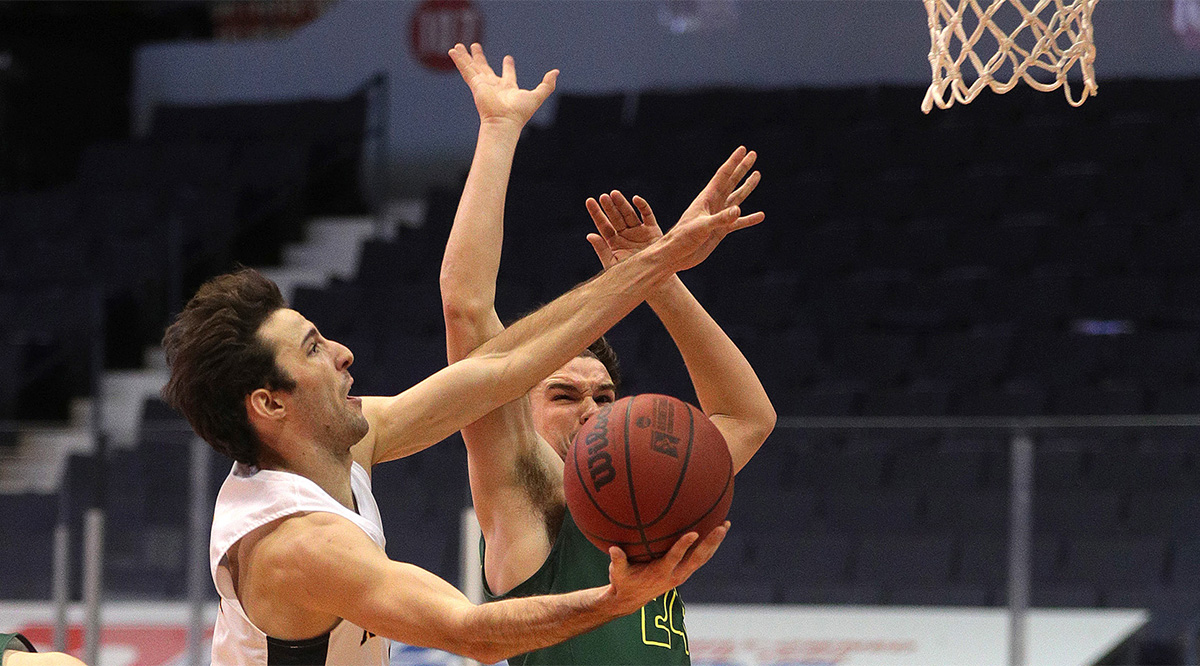
|
| St. John Fisher athletics photo |
By Ryan Scott
D3hoops.com
Like many coaches, Melissa Kuberka was working a plan. The third-year women’s basketball coach at St. John Fisher made the most of her new start at a traditionally strong program. She brought in a nine-member recruiting class who became the core of the team from the jump, making the conference championship game as freshmen and an NCAA appearance sophomore year. Then, the plan went in an unexpected direction.
“We lost on Friday,” says Kuberka of the Cardinals’ first-round loss in 2020, “then on Tuesday we found out the school was sending everyone home. There was no closure at the end of the year, no end of the year gathering, no individual meetings.”
From there, the nine member now-junior class was reduced with players opting out of the season. St. John Fisher brought the campus back early, in mid-August, but, of course, the team couldn’t practice until Oct. 1. Nine days later, the campus shut down again, this time until February.
This story isn’t unique, of course, nobody has really known how this year would play out, when or if games could be played, or which players might be available. As we’ve seen, even with teams who’ve been playing since November, rosters aren’t known or stable from one day to the next.
Adaptation has been the name of the game. Rolling with the punches and the positive tests.
“Obviously I was aware of the fact that everybody is different,” says Tufts coach, Jill Pace, who had her first year with the Jumbos cut short by COVID. “You know that people are unique and respond to things in different ways, but I’ve come to understand that more deeply this season.”
Tufts had some limited, distanced practices in the fall and they’ll have another practice window upcoming this spring, but there are no games on the horizon. “I’m excited for those teams who have been able to get out there and play,” says Pace. “I’m really enjoying watching live basketball again!”
One of the few bright spots during this pandemic is that ability, typically one sacrificed to the pursuit of coaching, that these people who absolutely love basketball, get to sit back and watch games without scouting or analysis (if they’re able to turn those parts of their brains off, after all this time). Other lost elements have been emerging, too.
“One of my biggest takeaways,” says Luke Flockerzi, men’s coach at Rochester, the lone UAA school expected to play games this season, “given our out-of-season limitations, very rarely do we get to help our players get better at basketball without a game on the horizon.”
Rochester had six weeks of practice in the fall, including a week of 5-on-5 before breaking at Thanksgiving. Like Flockerzi, many coaches appreciated the opportunity to teach the game in ways a typical Division III schedule just doesn’t allow. There’s an increasing call from coaches to implement some kind of non-competition period where skill development can be the focus; COVID has been an unexpected experiment in that direction.
“Still,” says Flockerzi, “there was a clear change in the mental condition of our players when games were on the horizon; you could see a spark in their eyes.”

|
| Rochester athletics photo |
Rochester has had to navigate some tricky restrictions to play – no travel beyond 100 miles and no opponents allowed on campus. They hosted Yeshiva off-site, and have found a few willing partners nearby. An hour on the bus is a far cry from the frequent plane trips typical of a UAA season, but Rochester, and every team, will take what they can get.
Kuberka surveyed her team anonymously in January, soliciting goals for this odd, late, truncated 2021 season. “No one mentioned winning games or even the conference championship,” she says. “Every answer was about getting better for next year, continuing to build relationships.” Still, these spring games – five Empire 8 schools have committed to a conference season and championship – have proven invaluable. “It’s a great opportunity for freshmen and transfers to contribute,” says Kuberka. “They’re getting lots of reps they would not get in a normal year.”
St. John Fisher doesn’t have a single senior, so everything they do is preparation to continue with Kuberka’s program building into next season. For all but the very few teams able to pull off a full slate of games, 2021 has been about looking forward.
“Twelve of our 18 guys took a leave of absence,” says Swarthmore men’s coach, Landry Kosmalski. “At our level, without scholarships, it seemed to make the most sense for most of our players. We have one senior graduating, but we’ll have just about everyone next year we were planning to have this year.”
Kuberka doesn’t have any seniors, but they’ve already been planning for the future. “I’d pay $40,000 in a heartbeat if I could play another season of college basketball,” she says, “But that might not be the best thing for our players. St. John Fisher has some grad programs that will align with their goals, but we don’t want anyone to take an extra year to complete undergrad just to play basketball.”
Access and availability of grad programs will make a difference, too. A huge university like Rochester offers a lot of options. Flockerzi will lose one senior to a job too good to pass up, but two others have found academic programs to further their education and allow for a third year. With its focus on academics, there will likely be a lot of Division III athletes weighing whether and where to use that extra year of eligibility during grad school.
Of course that is the future and there is still an ongoing season. Many conferences finished their seasons last weekend; others are just beginning. We’ve seen basketball games currently scheduled through the month of April, as schools work to provide as much meaningful experience as possible.
St. John Fisher still has a chance to hang a banner. Rochester will be working hard to send Kailan Lee out on a high note. Tufts and Swarthmore will keep hosting those Zooms and working to further the respective team cultures that have provided so much success.
“When I was younger,” says Kosmalski, “I think I went by that Larry Bird idea his coach told him, ‘if you’re not working, someone else is,’ but this is such a long break, I think whether you play or not, we’re all in the same boat. It’s going to be a longer process for us to get back, but I think we will. We’ll come back with a different perspective and we’ll be grateful for the opportunity.”
When asked if not playing this year puts her team at a disadvantage, Pace reflects the tough mentality we’ve come to expect from the Tufts program, “We’ll be just fine,” she says with confidence. “It’s definitely a challenge, but we’re working to maintain team culture in unique ways
There’s very little focus on what’s been lost or what disadvantages not playing this season when other teams are might have on the future. “It’s definitely a challenge,” says Pace, “but we’re maintaining team culture in unique ways, we continue to communicate and listen to each other, and we’re continuing to get better.”
None of this year was in any coach’s plan, but one thing remains the same: whether they’re playing in March or not, every Division III basketball team is working hard to make themselves the best students, the best athletes, the best people they can be, and they’re looking to the future with high expectations.
